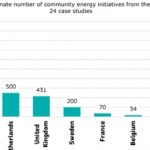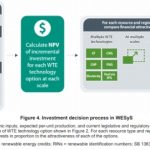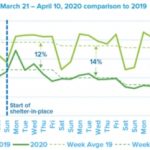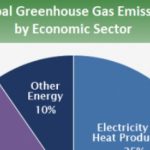The choice between using the EU ETS or national climate targets to decarbonise is a false dilemma. We need both, explains Chiara Corradi at T&E writing for the Florence School of Regulation. There are plenty of examples where a carbon market and national targets have delivered good results together, as in Germany, Finland, Denmark and Portugal. And, looking ahead over the next few decades, the right policies should be able to cope with ETS … [Read more...]
Investing in Hydrogen: is there a “first mover advantage”?
Is there a “first mover advantage” – or not - for an investor in the new hydrogen economy? Michiel Korthals Altes offers a series of “tests” of investment decisions based on the following criteria: economics, climate efficiency, system optimum, price stability, regulation, technology, now and in the future. He concludes that until the sector reaches maturity, conversion inefficiencies make the production of hydrogen a poor choice for most … [Read more...]
EC Consultation: ESG ratings need regulation to fix inconsistencies and bias
There are multiple problems with ESG ratings and that’s why they need to be properly regulated, says Hazel James Ilango at IEEFA. Different ratings agencies have different methodologies that are difficult to compare. They can lack transparency and be biased due to industry, geographical location or company size. As for a company’s impact on the planet and society, it can be overrated or underrated due to the aggregation of Environmental, Social … [Read more...]
The benefits of Peer-To-Peer Electricity Trading for communities and grid expansion
The adoption of peer-to-peer (P2P) electricity trading will turn individual consumers from passive to active managers of their networks. Such a marketplace can relieve constraints on the growing system and offer an alternative to costly grid reinforcements. Arina Anisie and Francisco Boshell at IRENA run through the benefits, including investment costs, bills, resilience, congestion, mini-grids, energy access, and more. They note that very few … [Read more...]
Waste-to-Energy is underperforming. Whole-energy-system simulator can uncover the bottlenecks
The potential for Waste-to-Energy (WTE) in the U.S. is 674 TWh/year, roughly 8% of the energy used by the transportation sector. However, for reasons not easily understood, many WTE technologies struggle to make it to commercial scale. Researchers at NREL have built a first-of-a-kind simulation model, WESyS, to create scenarios and understand where the bottlenecks are. The whole-energy system is always complex. The WESyS simulation modules … [Read more...]
Europe’s new Hydrogen Strategy: the questions that still need answering
Yesterday saw the launch of the EC’s new Hydrogen Strategy, the focus of our next live online discussion and Q&A. Register now to join us at the event next Wednesday at 12.45 CEST on Zoom to hear direct from the European Commission's Dr. Florian Ermacora, Future Energy System expert Prof. dr. Ad van Wijk, Giulia Branzi - Head of Regulation at event partner SNAM and trading specialist Marcel Steinbach of BDEW. Here, to set the scene, Gökçe … [Read more...]
Sales down, but cash preserved too: Regulators take note when setting new Utility rates
Utilities are suffering financial impacts because of the current pandemic, and regulators will be asked to address them when they set new electricity rates. The intention will be to help the utilities recover while keeping bills affordable for their customers. But not all the impacts on the utilities are bad news, explains Jim Lazar at RAP looking at the U.S. Though revenues have dropped and some labour costs risen, there is a list of things that … [Read more...]
Global ‘sectoral’ treaties, legally binding corporate targets can turn around emissions rise
The United Nations Framework Convention on Climate Change started with a top-down legally binding Kyoto Protocol and ended up with a bottom-up ‘self-determined’ voluntary Paris Agreement, says Chandra Bhushan. As a result, nobody has the tools to drive global collective action to combat climate change. The author says that’s why emissions are at record levels. He recommends international ‘sectoral’ treaties to achieve real transition in energy, … [Read more...]
U.S. buildings electrification hindered by “new” renovation policies that are already out of date
U.S. buildings renovation policies are not keeping up with technological progress and therefore risk slowing down electrification and the uptake of cleaner fuels, say Jessica Shipley and Donna Brutkoski of the think tank Regulatory Assistance Project (RAP). For example, there are policies and incentives that favour the installation of more energy efficient appliances, but ignore whether the appliance is greener. Put simply, policies need to … [Read more...]
What’s next for the geopolitics of energy transformation?
January’s IRENA report “A New World” has kick-started the debate on how the accelerating deployment of renewables will affect and alter the global distribution of political and economic power. Jan Frederik Braun and Daniel Scholten review its findings and build on the list of issues that must be faced. For example, although the IRENA report focuses on electrification the authors say power-to-gas is likely to play a major role, and we must face up … [Read more...]
Climate Auctions can reduce emissions and accelerate regulatory, financial and infrastructure goals
Auctions for delivering an amount of power at a defined price are already well established for renewables. “Climate Auctions” do the same with carbon emissions: a carbon price is guaranteed to the winning bidder, but only paid on delivery of the emissions cut. Tyeler Matsuo and Julia Meisel at Rocky Mountain Institute say this is proving particularly useful in emerging and developing countries where progress in building up their climate laws is … [Read more...]
Governments can reshape the energy business: they are the biggest users
In our energy system we treat electricity as a commodity, which is sold by the unit, writes Walt Patterson, Associate Fellow at Chatham House. This provides an incentive to suppliers to maximise consumption – which is why our user-technology is so wasteful. But according to Patterson, electricity is not a commodity, it’s a process in infrastructure. What matters is not the functioning of some ‘electricity market’ but long-term investment in this … [Read more...]













